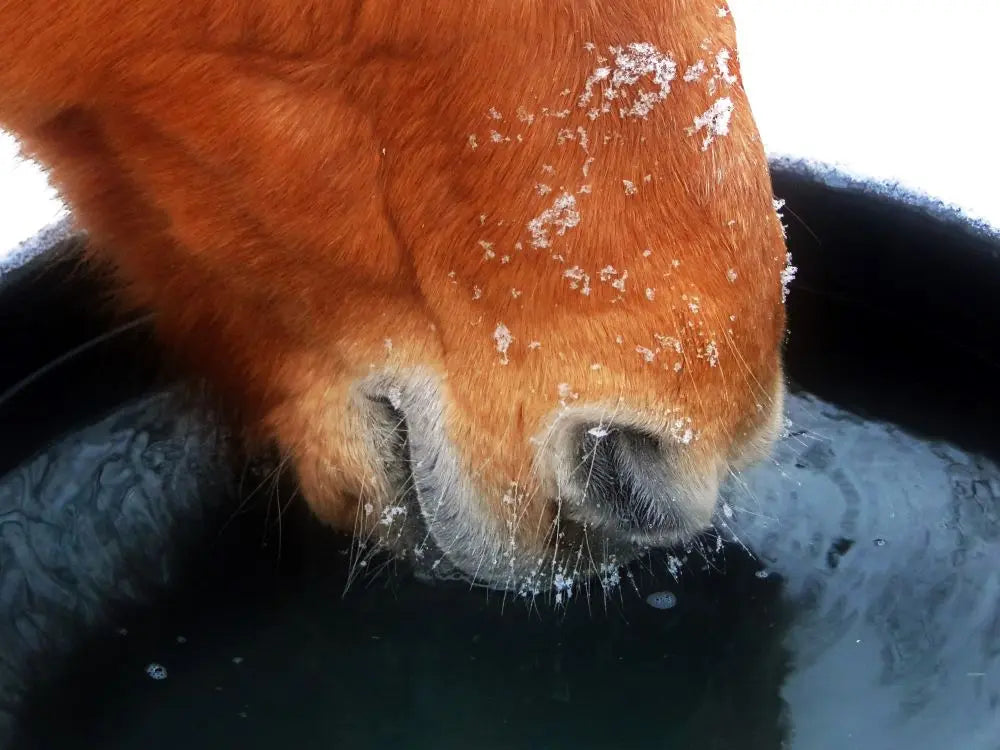From £6.99

Winter Horse Care: Hydration, Digestion, and Weight
Strategies for Ensuring Proper Hydration
Ensuring that your horse stays adequately hydrated during the winter is crucial. Cold weather can often result in horses drinking less water, which can lead to dehydration and associated health issues such as colic. One effective strategy is to encourage water intake by offering warm water. Horses are more likely to drink water that is warmer than icy cold, which can help increase their overall intake.
In addition to offering warm water, incorporating soaked feeds into your horse's diet can be beneficial. Soaking feeds such as beet pulp or alfalfa can add moisture to your horse's diet, making it easier for them to stay hydrated. The palatability of soaked feeds can also encourage fussy drinkers to consume more water, helping to maintain proper hydration levels.
Regularly checking water troughs and breaking ice as needed is also important.
Fibre for Optimal Health
Fibre is a vital part of a horse's diet, especially during the winter months. Increasing forage intake not only aids in digestive health but also contributes to maintaining body warmth. As forage ferments in the horse's digestive tract, it generates heat, which helps keep the horse's core body temperature warm during the colder months.
To support optimal health, it is essential to include a range of fibre sources in your horse's diet. Different types of forage, such as hay, haylage, and chaff, can help maintain a balanced gut microbiome. Providing a variety of fibre sources can aid in stabilising gut microbes, which is crucial for overall digestive health. During winter, when fresh pasture may be less available, supplementing with additional fibre can help compensate for any dietary shortfalls.
Additionally, some horses might benefit from forage alternatives if they have specific dietary needs. For instance, horses with sensitivities to certain types of forage might do well with alternatives that still provide the necessary fibre without causing digestive upset.
Keeping an eye on your horse's forage consumption and adjusting their diet as needed can help ensure they receive the right amount of fibre. In some cases, adding prebiotics or probiotics can further support a healthy gut, especially during times of dietary change or stress. Ensuring your horse has constant access to high-quality forage can make a significant difference in their overall health and well-being during the winter months.
Addressing Dental Challenges
Horses with dental challenges may find it difficult to chew fibrous feeds effectively, leading to inadequate nutrition and discomfort. For these horses, offering hay alternatives can be beneficial. Consider providing softer forage options such as soaked hay cubes or hay pellets, which are easier to chew and digest. These alternatives ensure your horse still receives the necessary nutrients and fibre intake without discomfort.
Regular dental check-ups are essential to identify and address any issues promptly. Monitoring your horse for signs of discomfort while eating is crucial. Look for behaviours such as dropping feed or showing reluctance to chew. If you notice these signs, it may be necessary to adjust their diet or consult with a veterinarian for further evaluation and treatment.
Maintaining Ideal Weight
For horses prone to gaining weight, choosing low-energy feeds or supplements can help manage their diet while ensuring they receive essential nutrients. These options are crafted to provide a balanced diet without adding excessive calories, making them ideal for weight control.
Consistent monitoring of your horse's body condition is crucial. Employ a body condition scoring system to assess their weight accurately. Regular assessments allow for timely dietary adjustments, helping to maintain a healthy weight range during the winter months.
Exercise is another key component in managing your horse's weight. Where feasible, incorporating regular physical activity can help burn off excess calories and maintain fitness. Activities such as riding, lunging, or even simple turnout can contribute positively to their overall health and weight management.
It's also essential to manage forage intake carefully. While fibre is critical for digestive health and warmth, excessive consumption can lead to weight gain. Measure forage portions and avoid overfeeding to keep your horse within a healthy weight range. Adjusting the type and amount of forage based on your horse's individual needs can prevent unnecessary weight gain.
For horses with specific dietary needs, such as metabolic issues, consulting with a veterinarian or equine nutritionist can provide valuable insights. They can recommend tailored feeding programmes that balance nutritional requirements with weight management goals. Additionally, regular health check-ups can help identify any underlying issues that might affect your horse's ability to maintain an ideal weight.
Finally, consider the use of slow feeders or hay nets to extend the duration of eating, thereby preventing overeating and aiding in weight control. These tools can help regulate forage intake, ensuring your horse consumes the appropriate amount without gaining excess weight.
Aiding in Weight Gain
For horses that require weight gain during the winter, it is crucial to supply energy-dense feeds in multiple small meals throughout the day. This approach can help optimise digestion and nutrient absorption, thereby making it easier for your horse to gain weight.
Monitoring calorie intake is key when aiming to support weight gain. If your horse is not putting on weight as anticipated, it may be necessary to increase the calorie content of their diet. Incorporating oil or fat-rich supplements can be an effective method to boost caloric intake without significantly increasing the volume of feed.
Another important aspect is ensuring that your horse's diet includes high-quality protein sources, which are essential for muscle development and overall health. Consider adding feeds that are rich in protein, such as soybean meal or alfalfa, to support healthy weight gain.
In addition, providing a balanced diet that includes essential vitamins and minerals is vital. A comprehensive vitamin and mineral supplement can ensure that your horse receives all the necessary nutrients to support healthy weight gain and overall well-being.
For horses that are underweight due to medical conditions or other issues, consulting with a veterinarian or equine nutritionist can offer valuable guidance. They can help develop a tailored feeding programme that addresses your horse's specific needs and weight gain goals.
Lastly, creating a stress-free environment is important, as stress can negatively impact a horse's ability to gain weight. Ensure your horse has a comfortable living space, regular companionship, and a consistent routine to support their overall health and weight gain efforts.
